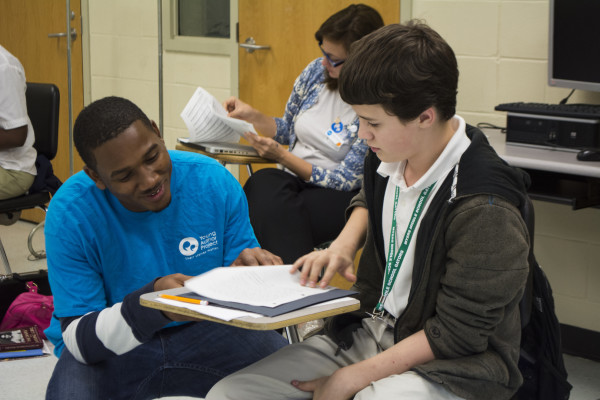

Some of the best opportunities for a fulfilling post-military career are in a field you’ve probably never considered.
About a year before leaving the Army, as I began my transition process, recruiters were calling me several times a week. Private companies seek out military leaders because they wisely value the leadership experience that we bring to the table. But while I was grateful for the attention from these headhunters, their pitches always lacked a certain something.
Finally, I figured out what was missing: I didn’t care about the missions of their companies.
I didn’t care how many tubes of toothpaste they sold or how efficiently they could produce them, and their bottom line didn’t interest me because it just felt inconsequential. I’m self-aware enough to know that I’m too idealistic for that kind of work. I need a mission. Granted, everyone isn’t wired this way (those are great jobs and someone should have them), but I am, so I decided to look elsewhere for a post-Army career.
Eventually, I stumbled into a career field where I feel uniquely qualified, fulfilled, plugged-in, and challenged by real, complex, interesting problems: Nonprofits.
Through my research, I learned that there is more to nonprofit organizations than hippies and the Peace Corps. This field is chock-full of smart, motivated people addressing lofty, resonant missions that I could get excited about, like curing cancer, ending hunger or poverty, fixing education, or advocating for rape victims or wounded veterans.
Now, three years after leaving the military, I feel like I’m on a mission every single day when I go to work, because I am. I run a small nonprofit organization that works to fight illiteracy in Savannah, Georgia, particularly among low-income youth.
I found this job by chance, not through a headhunter or a career fair or even my alumni association. I found it by volunteering in my community on a resume-building whim. After volunteering at the Deep Center, I was subsequently hired onto the staff once the organization recognized me as an asset.
There’s been a big push lately for veterans to become entrepreneurs and small business owners, which is great news for those who want to do that kind of work. I’m hoping the next big push will be for vets to become leaders in social entrepreneurship, where the currency is social change and the bottom line is calculated by asking how much progress towards solving the problem was made. Many veterans may not realize that they are well suited for leading small nonprofits — especially those who want to answer the kind of “call to service” that we experienced in the military.
Having worked in this field for about two years now, I’ve learned that one of the reasons transitioning soldiers never hear about these jobs is that nonprofits are notoriously bad at recruiting and marketing. Even big ones like the United Way can’t compete with behemoth for-profits like Procter & Gamble when it comes to grabbing veterans’ attention. During my own transition, the Army assigned me a career counselor. When I told her I might want to work in the nonprofit field, she said she had no idea what I was talking about.
But within the nonprofit world exists a diverse range of jobs in leadership, operations, project management, training, finance, among others, and veterans are completely missing out on these opportunities because not enough people are talking about them.
Nonprofits are often referred to as the social or the “third” sector because the overarching purpose is to fill the gaps between what the public and private sectors are able to provide. Lately, with gridlock in Washington, and a stagnant job market, those gaps are growing, so we need effective, well-run nonprofits more than ever and they need us. They need leaders.
Small and medium-sized nonprofits are particularly in need of leaders who are mission-focused, know how to delegate, implement a plan with limited resources, learn from mistakes, and develop a team.
If you want to find out more about this field, your best bet is to seek out opportunities in your community on idealist.org or opportunityknocks.org.
You can also get involved by applying for a fellowship with The Mission Continues, a nonprofit organization that partners transitioning veterans with action-oriented initiatives to build stronger communities and tackle pressing issues.
Full disclosure: You probably won’t get “rich” working at a nonprofit organization, but I guess that depends on your definition of the term. This is to say that if you do end up working for a cause that truly matters to you — even if you just start out as a volunteer and work your way up — you just might find yourself in that holy grail of careers where you are truly fulfilled.
